Music has the potential to provide valuable and powerful support for wellbeing across the whole of our lifespan, from infancy right through to end of life care[1].
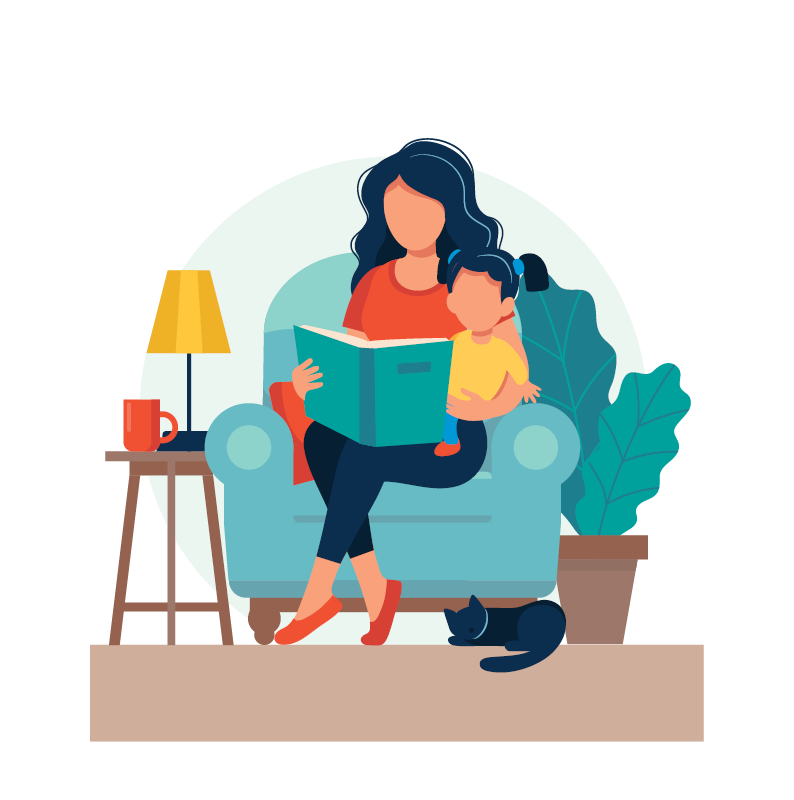

Boosts Reading and Language
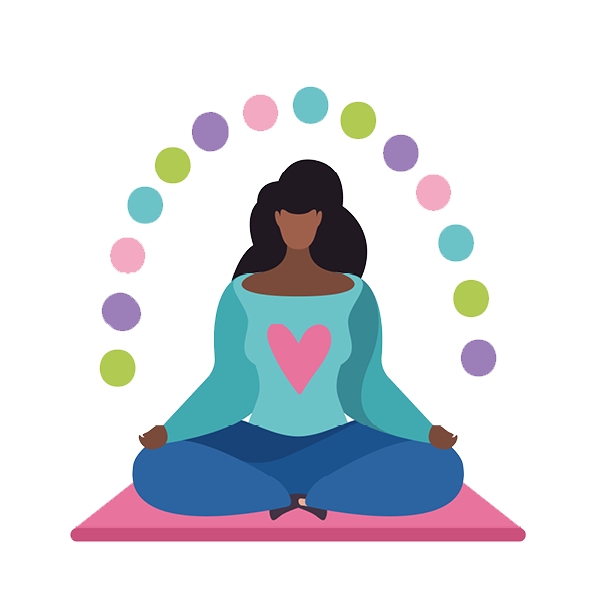

Relieves Stress and Anxiety
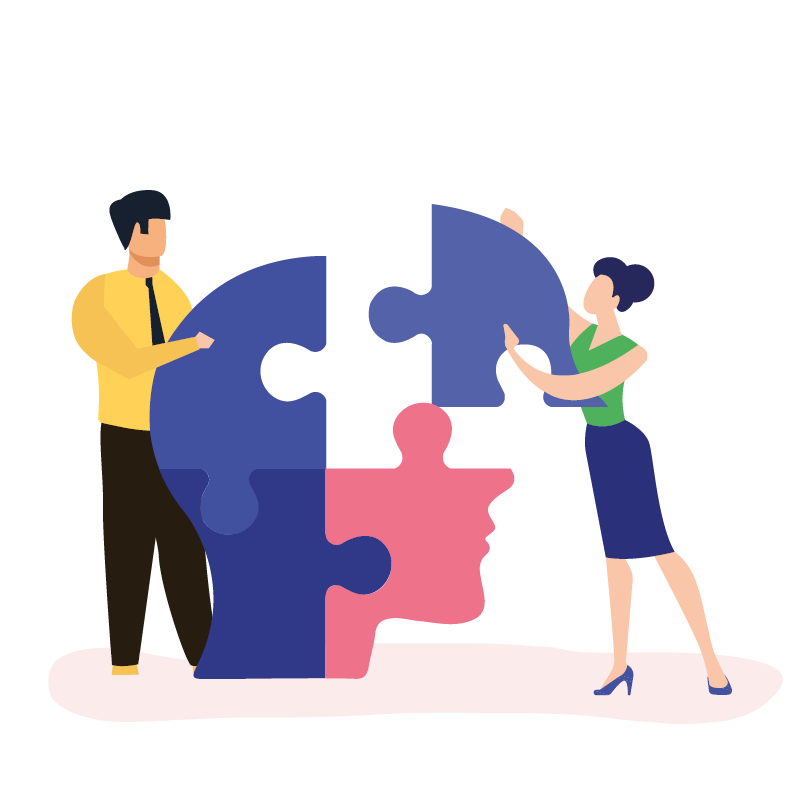

Reduces the Risk of Dementia
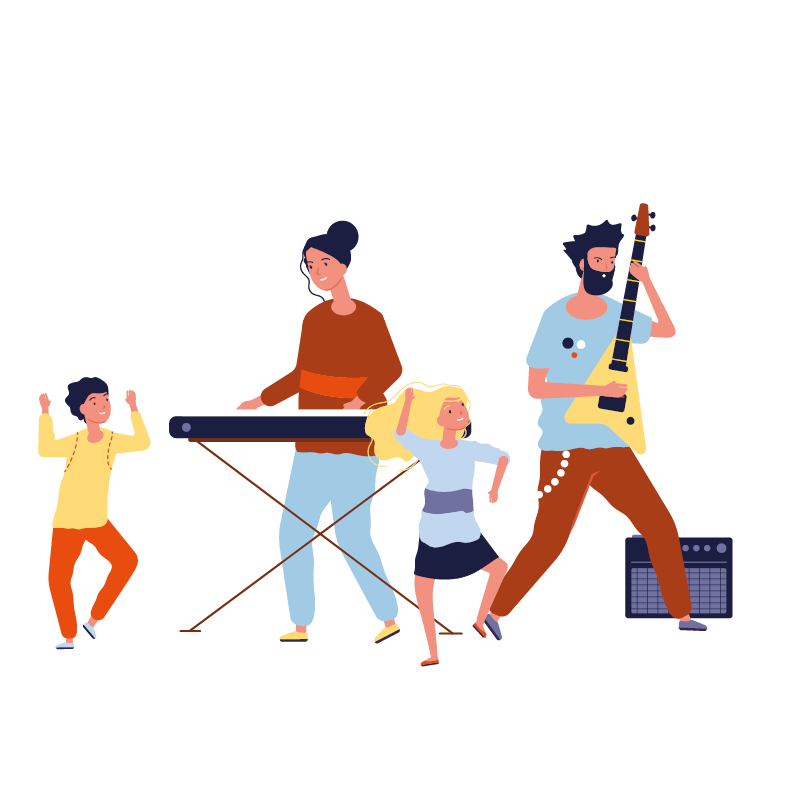

Improves Confidence and Mood
Music Can Make You Smarter
Learning to play an instrument in childhood enhances reading [2], makes phonetic sounds easier to process and improves comprehension and spelling [3].
Research suggests that musicians are often good at learning languages [5] and have better hearing ability [6]. Concentration skills, co-ordination [7] and memory capacity [8][9][10] get a boost, too.
Above all, it's fun. Children that play a musical instrument have stronger friendships and higher levels of wellbeing [11].
⇦ Watch the video to find out more (1 minute)
Music Can Make You Happier
Did you know that playing a musical instrument can help alleviate stress [15] and reduce anxiety? [16].
Playing music helps us cope with depression [20] and makes mood regulation easier [21]. Having a creative outlet is good for your brain, potentially making you happier [17].
For those with busy schedules, it's vital to squeeze in some down time. Music therapy and listening to calming music can reduce your heart rate [1c] and help you sleep better [18].
Most importantly, learning to play an instrument is great fun.
Watch the video to find out more (1 minute) ⇨
Music Can Make You Healthier
Playing and listening to music stimulates natural antibodies in your immune system and reduces cortisol, a marker of a stress in the body [23].
Later in life, playing a musical instrument helps to maintain a healthy memory and speech processing skills [1e].
Active music making has been found to be an effective complimentary therapy in the treatment of dementia, depression and the effects of a stroke [1g] [1h].
And, above all, playing a keyboard or piano is really enjoyable and keeps your mind fit and healthy.
⇦ Watch the video to find out more (1 minute)
We think music can make you smarter, happier and healthier. This article is for information purposes only and highlights the incredible benefits of listening to music and learning to play a musical instrument. Casio UK makes no claim that purchasing or using an electronic keyboard will guarantee the effects or benefits described in the research cited.
References
[1] Williamson, V. 2014. You are the Music. London. Icon Books Ltd.
[1a] ibid. p.209
[1b] ibid. p.210
[1c] ibid. p.218
[1d] ibid. p.108
[1e] ibid. p.96
[1f] ibid. p.185
[1g] ibid. p.218
[1h] ibid. p.214
[2] Tierney, A. and Kraus, N., 2013. Music Training for the Development of Reading Skills. [online] Adamtierney.net. Available at:
[3] Strait, D., and Kraus, N. (2011), 'Playing music for a smarter ear: Cognitive, perceptual and neurobiological evidence', Music Perception, 29(2), 133-146.
[3a] Straight, D.L., Parberry-Clark,A., Hittner, E., and Kraus, N. (2012), 'Musical training during early childhood enhances neural encoding of speech in noise', Brain and Language, 123, 191-201.
[4] Mashayekha, M. and Hashemi, M., 2011. The Impact/s of Music on Language Learners’ Performance. [online] core.ac.uk. Available at:
[5] Slevc, L.R., and Miyake, A., 2006, 'Individual differences in second language proficiency: Does musical ability matter?' Psychological Science, 17(8), 675-681.
[6] Skoe, E. and Kraus, N., 2012. A Little Goes a Long Way: How the Adult Brain Is Shaped by Musical Training in Childhood. [online] Jneurosci.org. Available at:
[7] Preda-Uliţă, A., 2016. Improving children’s executive functions by learning to play a musical instrument. [online] Webbut2.unitbv.ro. Available at:
[8] Bawden, T., 2020. Learning an instrument can help children with memory and creativity, study finds. [online] inews.co.uk. Available at:
[9] Guo, X., Ohsawa, C., Suzuki, A. and Sekiyama, K., 2018. Improved Digit Span in Children after a 6-Week Intervention of Playing a Musical Instrument: An Exploratory Randomized Controlled Trial. [online] Frontiers in Psychology. Available at:
[10] M Piro, J. and Ortiz, C., 2009. Music Education Can Help Children Improve Reading Skills. [online] Science Daily. Available at:
[11] Schellenberg, E. and Mankarious, M., 2012. Music Training and Emotion Comprehension in Childhood. [online] Utm.utoronto.ca. Available at:
[12] Luísa Veloso, A. and Carvalho, S., 2009. Music composition as a way of learning: emotions and the situated self. [online] researchgate.net. Available at:
[13] Anvari, S.H., Trainor, L.J., Woodside, J., and Levy, B.A. 2002, 'Relations among musical skills, phonological processing, and early reading ability in preschool children', Journal of Experimental Child Psychology, 83(2),111-130.
[14] Moreno, S., and Besson, M. (2006), 'Musical training and language-related brain electrical activity in children' Psychophysiology, 43(3), 287-291.
[15] Austin, V., Shah, S. and Muncer, S., 2005. Teacher stress and coping strategies used to reduce stress. [online] Onlinelibrary.wiley.com. Available at:
[16] Gynn, S., 2013. Music Benefits Both Mental And Physical Health. [online] Medicalnewstoday.com. Available at:
[17] Seinfield, S. et al., 2013, Effects of music learning and piano practice on cognitive function, mood and quality of life in older adults. [online] Frontiers in Psychology. Available at:
[18] Newsom, R., 2022. Music and sleep. [online] Sleep Foundation. Available at:
[19] Bryant, S., 2014. Benefits of Learning and Playing Music for Adults. [online] NAMM Foundation. Available at:
[20] Nilsson, U., 2008. The anxiety- and pain-reducing effects of music interventions: a systematic review. [online] PubMed. Available at:
[21] Schwartz, K.D., and Fouts, G.T. 2003, 'Music preferences, personality style and development issues of adolescents', Journal of Youth and Adolescence, 32(3), 205-213.
[22] Maratos, A., Crawford, M. and Procter, S., 2018. Music therapy for depression: it seems to work, but how?. [online] Cambridge Core. Available at:
[23] McKinney C.H., et al (1997), 'Effects of guided imagery and music (GIM) therapy on mood and cortisol in healthy adults' Health Psychology, 16(4), 390-400. Koelsch, S., et al. (2011), 'Effects of Music Listening on Cortisol Levels and Propofol Consumption during Spinal Anaesthesia', Frontiers in Psychology, 2, 58.
[24] Vasionytė, I. and Madison, G., 2013. Musical intervention for patients with dementia: a meta-analysis. [online] Pub Med. Available at:
[25] Simmons-Stern, N., Budson, A. and Ally, B., 2010. Music as a Memory Enhancer in Patients with Alzheimer’s Disease. [online] NCBI. Available at:
[26] Särkämö, T. and Soto, D., 2012. Music listening after stroke: beneficial effects and potential neural mechanisms. [online] Pub Med. Available at:
[27] Steakley, L., Conger, K. and MacCormick, H., 2012. How music therapy may benefit surgery patients. [online] Scope Blog. Available at:
[28] Seinfeld, S., Figueroa, H., Ortiz-Gil, J. and Sanchez-Vives, M., 2013. Effects of music learning and piano practice on cognitive function, mood and quality of life in older adults. [online] Frontiers in Psychology. Available at:
[29] Raglio, A., 2015. Music Therapy Interventions in Parkinson’s Disease: The State-of-the-Art. [online] Pub Med. Available at:
References:
[1] Williamson, V. 2014. You are the Music. London. Icon Books Ltd.
[1a] ibid. p.209
[1b] ibid. p.210
[1c] ibid. p.218
[1d] ibid. p.108
[1e] ibid. p.96
[1f] ibid. p.185
[1g] ibid. p.218
[1h] ibid. p.214
[2] Tierney, A. and Kraus, N., 2013. Music Training for the Development of Reading Skills. [online] Adamtierney.net. Available at: <http://adamtierney.net/pubs/Tierney_chapter_2014.pdf?i=2> [Accessed 11 April 2022].
[3] Strait, D., and Kraus, N. (2011), 'Playing music for a smarter ear: Cognitive, perceptual and neurobiological evidence', Music Perception, 29(2), 133-146.
[3a] Straight, D.L., Parberry-Clark,A., Hittner, E., and Kraus, N. (2012), 'Musical training during early childhood enhances neural encoding of speech in noise', Brain and Language, 123, 191-201.
[4] Mashayekha, M. and Hashemi, M., 2011. The Impact/s of Music on Language Learners’ Performance. [online] core.ac.uk. Available at: <https://core.ac.uk/download/pdf/82239319.pdf> [Accessed 11 April 2022].
[5] Slevc, L.R., and Miyake, A., 2006, 'Individual differences in second language proficiency: Does musical ability matter?' Psychological Science, 17(8), 675-681.
[6] Skoe, E. and Kraus, N., 2012. A Little Goes a Long Way: How the Adult Brain Is Shaped by Musical Training in Childhood. [online] Jneurosci.org. Available at: <https://www.jneurosci.org/content/jneuro/32/34/11507.full.pdf> [Accessed 11 April 2022].
[7] Preda-Uliţă, A., 2016. Improving children’s executive functions by learning to play a musical instrument. [online] Webbut2.unitbv.ro. Available at: <http://webbut2.unitbv.ro/Bulletin/Series%20VIII/BULETIN%20I/10_PREDA.pdf> [Accessed 11 April 2022].
[8] Bawden, T., 2020. Learning an instrument can help children with memory and creativity, study finds. [online] inews.co.uk. Available at: <https://inews.co.uk/news/science/learning-musical-instruments-children-memory-creativity-682684> [Accessed 11 April 2022].
[9] Guo, X., Ohsawa, C., Suzuki, A. and Sekiyama, K., 2018. Improved Digit Span in Children after a 6-Week Intervention of Playing a Musical Instrument: An Exploratory Randomized Controlled Trial. [online] Frontiers in Psychology. Available at: <https://www.frontiersin.org/articles/10.3389/fpsyg.2017.02303/full#h10> [Accessed 11 April 2022].
[10] M Piro, J. and Ortiz, C., 2009. Music Education Can Help Children Improve Reading Skills. [online] Science Daily. Available at: <https://www.sciencedaily.com/releases/2009/03/090316075843.htm> [Accessed 11 April 2022].
[11] Schellenberg, E. and Mankarious, M., 2012. Music Training and Emotion Comprehension in Childhood. [online] Utm.utoronto.ca. Available at: <https://www.utm.utoronto.ca/~w3psygs/FILES/SchellenbergMankarious2012.pdf> [Accessed 11 April 2022].
[12] Luísa Veloso, A. and Carvalho, S., 2009. Music composition as a way of learning: emotions and the situated self. [online] researchgate.net. Available at: <https://www.researchgate.net/profile/Ana-Veloso-4/publication/290049158_Music_composition_as_a_way_of_learning_Emotions_and_the_situated_self/links/59590b45a6fdcc2beca946c0/Music-composition-as-a-way-of-learning-Emotions-and-the-situated-self.pdf> [Accessed 11 April 2022].
[13] Anvari, S.H., Trainor, L.J., Woodside, J., and Levy, B.A. 2002, 'Relations among musical skills, phonological processing, and early reading ability in preschool children', Journal of Experimental Child Psychology, 83(2),111-130.
[14] Moreno, S., and Besson, M. (2006), 'Musical training and language-related brain electrical activity in children' Psychophysiology, 43(3), 287-291.
[15] Austin, V., Shah, S. and Muncer, S., 2005. Teacher stress and coping strategies used to reduce stress. [online] Onlinelibrary.wiley.com. Available at: <https://onlinelibrary.wiley.com/doi/pdfdirect/10.1002/oti.16> [Accessed 11 April 2022].
[16] Gynn, S., 2013. Music Benefits Both Mental And Physical Health. [online] Medicalnewstoday.com. Available at: <https://www.medicalnewstoday.com/articles/258383#1> [Accessed 11 April 2022].
[17] Seinfield, S. et al., 2013, Effects of music learning and piano practice on cognitive function, mood and quality of life in older adults. [online] Frontiers in Psychology. Available at: <https://www.frontiersin.org/articles/10.3389/fpsyg.2013.00810/full> [Accessed 19 April 2022].
[18] Newsom, R., 2022. Music and sleep. [online] Sleep Foundation. Available at: <https://www.sleepfoundation.org/noise-and-sleep/music> [Accessed 19 April 2022].
[19] Bryant, S., 2014. Benefits of Learning and Playing Music for Adults. [online] NAMM Foundation. Available at: <https://www.nammfoundation.org/articles/2014-06-01/benefits-learning-and-playing-music-adults?gclid=CjwKCAiA3o7RBRBfEiwAZMtSCW_4g3fWe4Tdvi8XVdoAfavwjvMFo84LHVP2sj_UoJRhyUJYgLcu4RoCaucQAvD_BwE> [Accessed 18 April 2022].
[20] Nilsson, U., 2008. The anxiety- and pain-reducing effects of music interventions: a systematic review. [online] PubMed. Available at: <https://pubmed.ncbi.nlm.nih.gov/18395022/> [Accessed 18 April 2022].
[21] Schwartz, K.D., and Fouts, G.T. 2003, 'Music preferences, personality style and development issues of adolescents', Journal of Youth and Adolescence, 32(3), 205-213.
[22] Maratos, A., Crawford, M. and Procter, S., 2018. Music therapy for depression: it seems to work, but how?. [online] Cambridge Core. Available at: <https://www.cambridge.org/core/journals/the-british-journal-of-psychiatry/article/music-therapy-for-depression-it-seems-to-work-but-how/2E07649AADFE2F027CF0F5951B89C004> [Accessed 18 April 2022].
[23] McKinney C.H., et al (1997), 'Effects of guided imagery and music (GIM) therapy on mood and cortisol in healthy adults' Health Psychology, 16(4), 390-400. Koelsch, S., et al. (2011), 'Effects of Music Listening on Cortisol Levels and Propofol Consumption during Spinal Anaesthesia', Frontiers in Psychology, 2, 58.
[24] Vasionytė, I. and Madison, G., 2013. Musical intervention for patients with dementia: a meta-analysis. [online] Pub Med. Available at: <https://onlinelibrary.wiley.com/doi/10.1111/jocn.12166> [Accessed 18 April 2022].
[25] Simmons-Stern, N., Budson, A. and Ally, B., 2010. Music as a Memory Enhancer in Patients with Alzheimer’s Disease. [online] NCBI. Available at: <https://www.ncbi.nlm.nih.gov/pmc/articles/PMC2914108/> [Accessed 18 April 2022].
[26] Särkämö, T. and Soto, D., 2012. Music listening after stroke: beneficial effects and potential neural mechanisms. [online] Pub Med. Available at: <https://pubmed.ncbi.nlm.nih.gov/22524369/> [Accessed 18 April 2022].
[27] Steakley, L., Conger, K. and MacCormick, H., 2012. How music therapy may benefit surgery patients. [online] Scope Blog. Available at: <https://scopeblog.stanford.edu/2012/11/20/how-music-therapy-may-benefit-surgery-patients/> [Accessed 18 April 2022].
[28] Seinfeld, S., Figueroa, H., Ortiz-Gil, J. and Sanchez-Vives, M., 2013. Effects of music learning and piano practice on cognitive function, mood and quality of life in older adults. [online] Frontiers in Psychology. Available at: <https://www.frontiersin.org/articles/10.3389/fpsyg.2013.00810/full> [Accessed 18 April 2022].
[29] Raglio, A., 2015. Music Therapy Interventions in Parkinson’s Disease: The State-of-the-Art. [online] Pub Med. Available at: <https://www.ncbi.nlm.nih.gov/pmc/articles/PMC4553388/> [Accessed 18 April 2022].
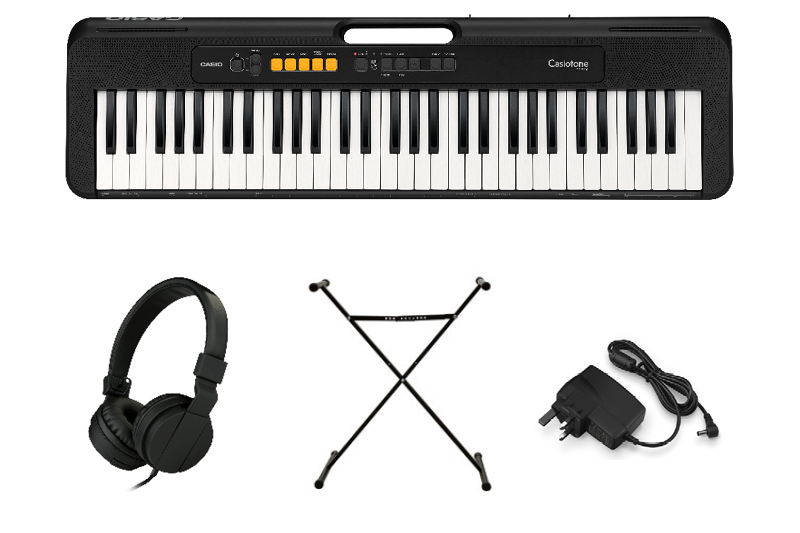

CT-S100 Home Learning Bundle
Make your first musical steps with this incredible value home learning bundle.
Everything you need is included: a power supply, keyboard stand and headphones.
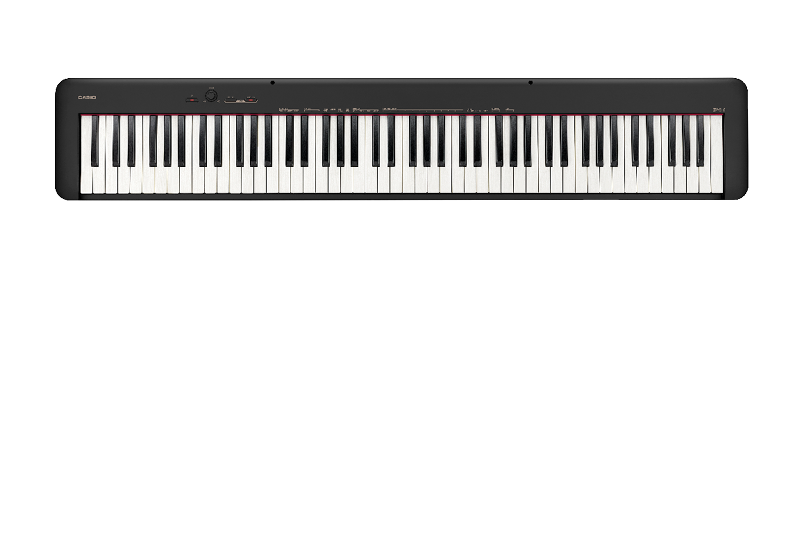

CDP-S110 Digital Piano
The CDP-S110 has 88 touch-sensitive, weighted keys that feel just like a traditional piano.
It connects easily to an iPad or computer when using music apps.
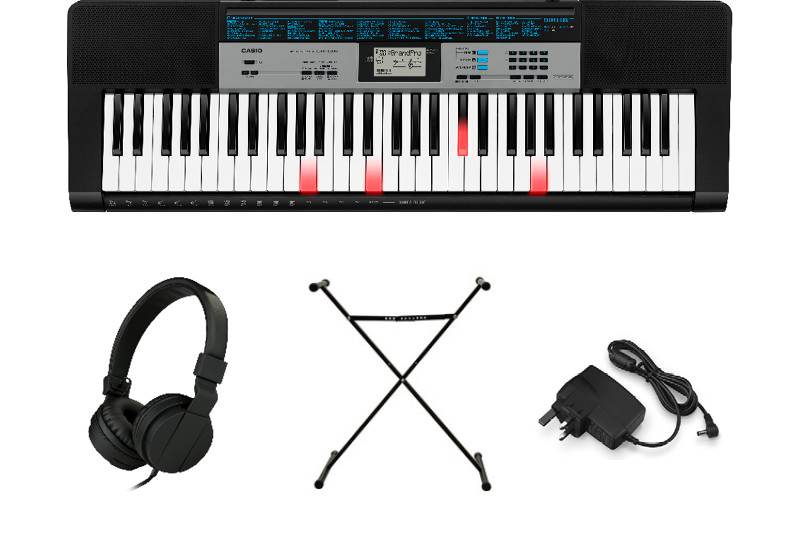

LK-136 Home Learning Bundle
Start playing in seconds with Casio's acclaimed lighted keys system.
Choose a song, press the start button and let the lights guide you to the correct notes.
Casio pianos and keyboards offer the best start for beginners of all ages. All our instruments include free online lessons to help you get started straight away:
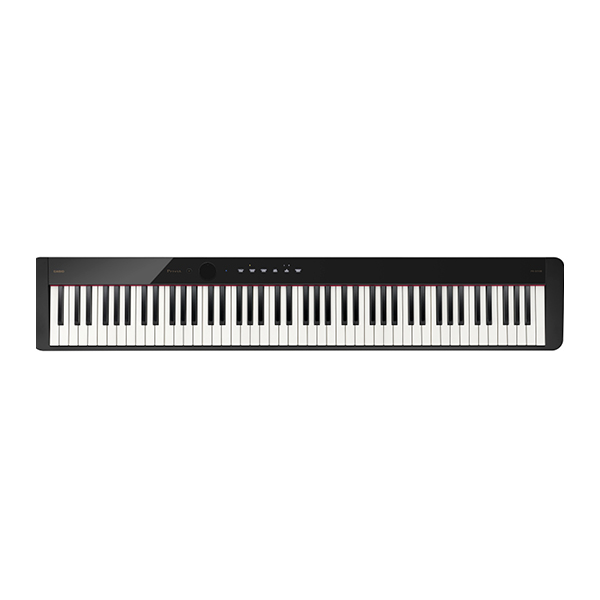

PX-S1100 Digital Piano
The world's slimmest digital piano makes it possible to enjoy a beautiful piano tone and an exceptionally authentic key touch in any living space. Features such as Bluetooth audio and app connectivity make this ideal for beginners and advanced players alike.
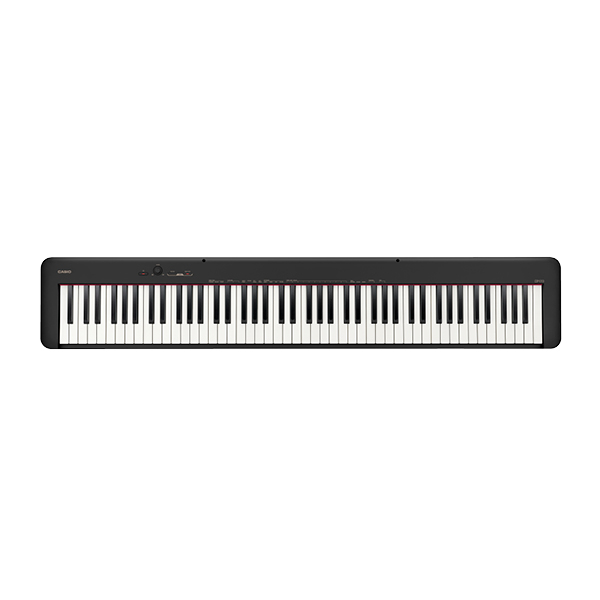

CDP-S110 Digital Piano
Playing the piano needn't be expensive. The CDP-S110 offers an exceptional quality sound and touch for a very reasonable price, allowing everybody to enjoy the spirit of music.
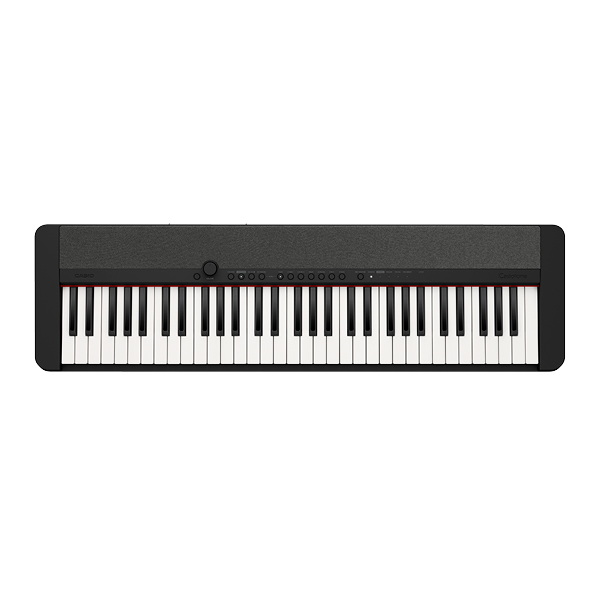

CT-S1 Keyboard
The CT-S1 is designed to be an easy to use portable keyboard with the same sound quality as a full size digital piano. Useful features such as touch sensitivity, a simple control panel and easy connection to a computer or tablet makes this the perfect first instrument for learning to play.
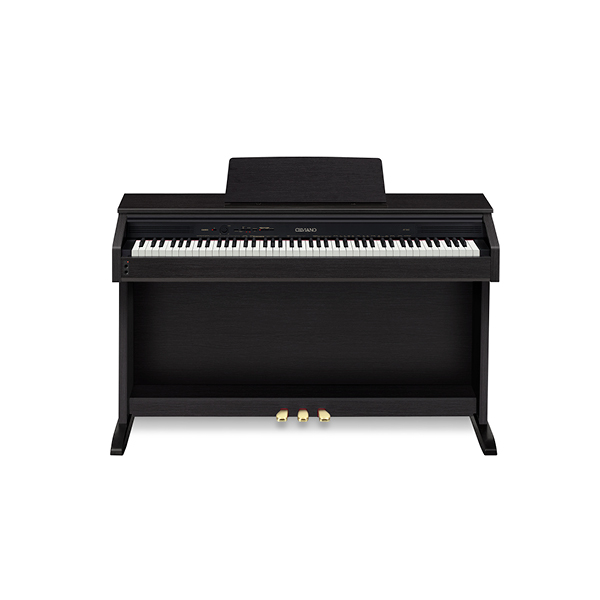

AP-260 Digital Piano
For experienced performers and beginners alike, the AP-260 is an excellent digital piano for the home. Offering a superior level of touch and tone, this compact instrument will give the joy of playing the piano for years to come.
Music Makes You Healthier.
We are lifelong learners, thanks to our brain's incredible ability to absorb and retain new things [1d]. Taking part in music later in life, over the age of 65, has many mental benefits, including maintaining healthy memory and speech processing skills [1e].
-
Listening to enjoyable music when in adulthood stimulates natural antibodies in your immune system and reduces cortisol, a marker of a stress in the body [23].
-
Musical memory can often survive when other areas and function of the brain are damaged, meaning that music making can be used to reach someone who has fading memory or cognitive functions, or is living with dementia [1f].
-
A meta analysis found that music interventions seem to be effective and have the potential of increasing the quality of life for patients with dementia [24].
-
Music heightens arousal in patients with Alzheimer’s disease, the most common form of dementia, allowing better attention and improved memory [25].
-
Active music making has been found to be an effective complimentary therapy in the treatment of not only dementia, but also depression and schizophrenia [1g].
-
Music listening after stroke also has beneficial effects. There are many [26] short- and long-term effects of music listening on the recovery of cognitive function in stroke patients.
-
Research has found that music can help with recovery, re-learning and rehabilitation after a stroke [1h].
-
Listening to music also reduces the stress experienced by patients both before, during and after surgery. Overall, patients who listened to music were less anxious, required less sedative medication, recovered more quickly and reported better satisfaction with their medical experience [27].
-
Playing piano and learning to read music can be a useful intervention in older adults to promote cognitive reserve (CR) and improve subjective well-being, as well as decrease depression and induce positive mood states [28].
In a study on patients with Parkinson's Disease (PD) that present depression or anxiety it was found that music can produce substantial effects on movement-related symptoms as well as psychological ones in PD treatment. The literature shows that playing and listening to music may modulate emotions, behaviours, movements, communication, and cognitive factors, modifying the activity of the brain areas involved in the perception and regulation of these aspects [29].
A lighted keys keyboard has everything you need to enjoy music straight away, with no prior knowledge required:
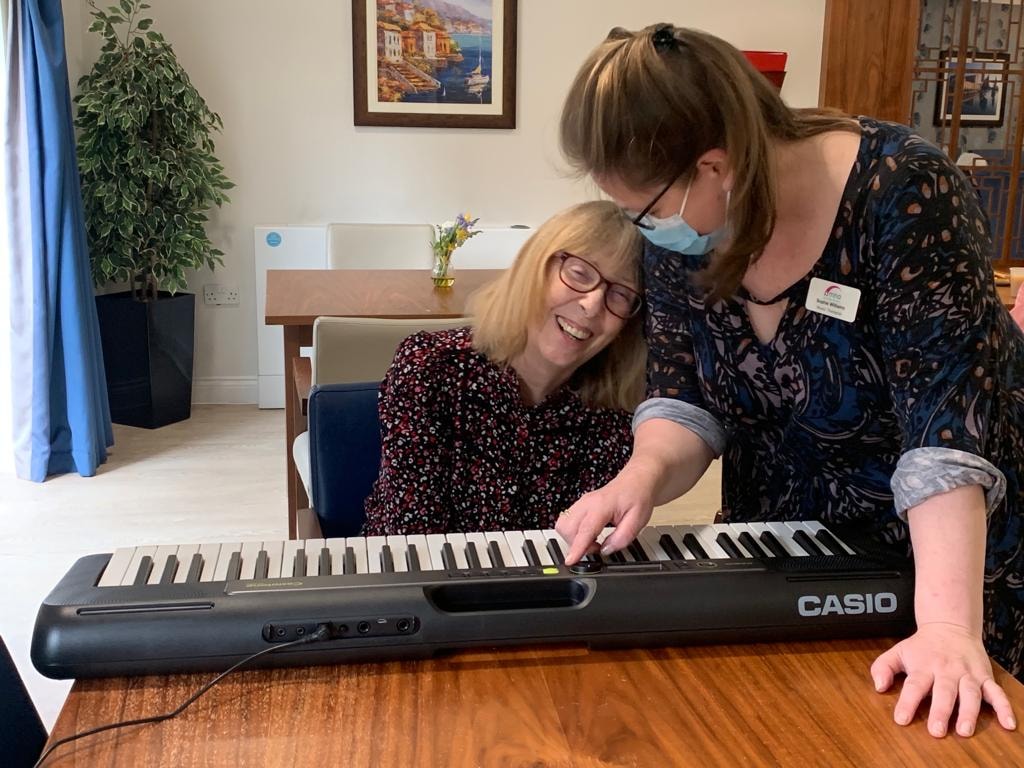

Case study - a short case study of the use of the Casiotone LK S250 key lighting keyboard in an MHA Residential Care Home in London.
'It was possible to see a clear cognitive progression in Jill’s use of the Casio keyboard: initially Jill was able to listen, recognise and then whistle along to the tune being played by the keyboard in ‘song’ mode [CLIP 1 - J whistling] she then followed the lit-up keys with a single finger when the keyboard was used in ‘lesson’ mode [CLIP 2 - J playing Ave Maria] as Jill had had piano lessons as a child, she gradually moved from using one finger to pick out notes to using her whole right hand and then both hands on the keyboard. When Jill recognised (or remembered) the tunes that she was trying to play, she was able to keep the rhythmic pattern of the tune intact while she was playing, even at the times when she played ‘incorrect’ (non-lit) notes. This feature of the keyboard supported Jill’s positive experience of playing a tune which has such a strong emotional resonance for her.'
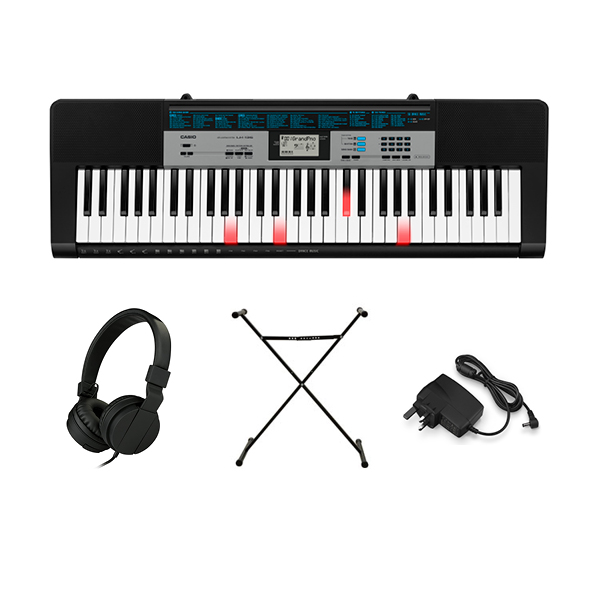

LK-136 Home Learning Bundle
An ideal starter keyboard, designed to get everybody playing the keyboard within seconds, thanks to Casio's lighted keys system.
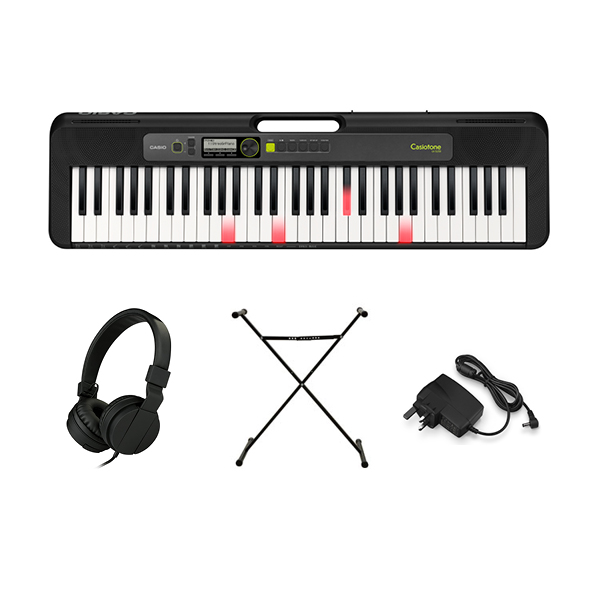

LK-S250 Home Learning Bundle
Compact and easy to use, the LK-S250 is a touch-sensitive keyboard that can connect to an iPad or computer for even more learning opportunities.
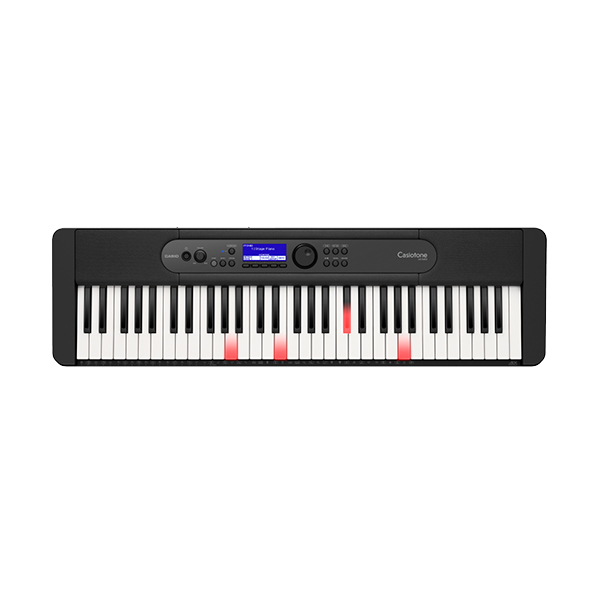

LK-S450 Lighted Keys Keyboard
The LK-S450 combines Casio's best sound technology with lighted keys. It even has the ability to expand the library of songs available.





